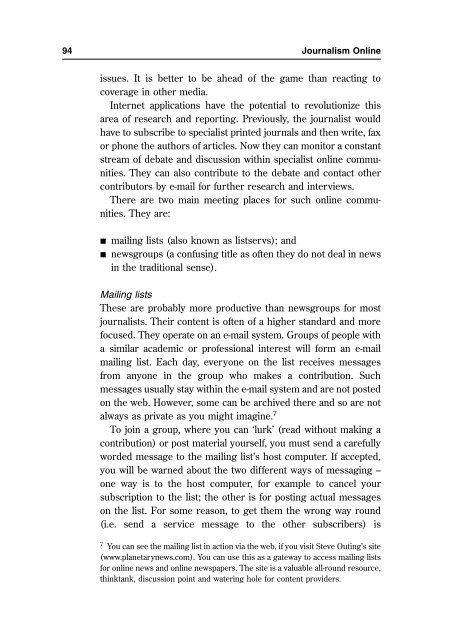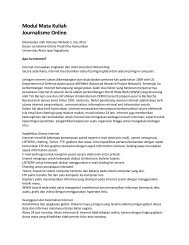1What is online journalism? - Ayo Menulis FISIP UAJY
1What is online journalism? - Ayo Menulis FISIP UAJY
1What is online journalism? - Ayo Menulis FISIP UAJY
You also want an ePaper? Increase the reach of your titles
YUMPU automatically turns print PDFs into web optimized ePapers that Google loves.
94 Journal<strong>is</strong>m Online<br />
<strong>is</strong>sues. It <strong>is</strong> better to be ahead of the game than reacting to<br />
coverage in other media.<br />
Internet applications have the potential to revolutionize th<strong>is</strong><br />
area of research and reporting. Previously, the journal<strong>is</strong>t would<br />
have to subscribe to special<strong>is</strong>t printed journals and then write, fax<br />
or phone the authors of articles. Now they can monitor a constant<br />
stream of debate and d<strong>is</strong>cussion within special<strong>is</strong>t <strong>online</strong> communities.<br />
They can also contribute to the debate and contact other<br />
contributors by e-mail for further research and interviews.<br />
There are two main meeting places for such <strong>online</strong> communities.<br />
They are:<br />
mailing l<strong>is</strong>ts (also known as l<strong>is</strong>tservs); and<br />
newsgroups (a confusing title as often they do not deal in news<br />
in the traditional sense).<br />
Mailing l<strong>is</strong>ts<br />
These are probably more productive than newsgroups for most<br />
journal<strong>is</strong>ts. Their content <strong>is</strong> often of a higher standard and more<br />
focused. They operate on an e-mail system. Groups of people with<br />
a similar academic or professional interest will form an e-mail<br />
mailing l<strong>is</strong>t. Each day, everyone on the l<strong>is</strong>t receives messages<br />
from anyone in the group who makes a contribution. Such<br />
messages usually stay within the e-mail system and are not posted<br />
on the web. However, some can be archived there and so are not<br />
always as private as you might imagine. 7<br />
To join a group, where you can ‘lurk’ (read without making a<br />
contribution) or post material yourself, you must send a carefully<br />
worded message to the mailing l<strong>is</strong>t’s host computer. If accepted,<br />
you will be warned about the two different ways of messaging –<br />
one way <strong>is</strong> to the host computer, for example to cancel your<br />
subscription to the l<strong>is</strong>t; the other <strong>is</strong> for posting actual messages<br />
on the l<strong>is</strong>t. For some reason, to get them the wrong way round<br />
(i.e. send a service message to the other subscribers) <strong>is</strong><br />
7 You can see the mailing l<strong>is</strong>t in action via the web, if you v<strong>is</strong>it Steve Outing’s site<br />
(www.planetarynews.com). You can use th<strong>is</strong> as a gateway to access mailing l<strong>is</strong>ts<br />
for <strong>online</strong> news and <strong>online</strong> newspapers. The site <strong>is</strong> a valuable all-round resource,<br />
thinktank, d<strong>is</strong>cussion point and watering hole for content providers.
















